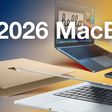Apple, Amazon, and Google are actively engaged in the bidding war to acquire Toshiba's NAND memory unit, according to a report by Yomiuri Shimbun Daily on Saturday (via Korean Herald).
According to the Japanese newspaper, there are now 10 bidders looking to buy Toshiba's lucrative semiconductor operation, which accounts for 20 percent of the NAND market. Nikkei reported on Friday that U.S. private equity firm Silver Lake and U.S. chipmaker Broadcom offered Toshiba about 2 trillion yen ($18 billion) for the unit. Other bidders include frontrunner and world's largest NAND flash maker, Western Digital, with Apple suppliers Foxconn and TSMC having been named early on as potential suitors.

"The US tech firms -- Apple, Google and Amazon -- have become the next attractive bidders following Western Digital as Toshiba can have stable supply chains (for smartphones or data servers) from them," an industry source told The Korea Herald.
On Thursday, Toshiba shareholders agreed to split off the NAND flash unit and sell it, in order to raise at least $9 billion to cover U.S. nuclear unit charges that threaten the conglomerate's future. Both Apple and Samsung are major clients of the unit, while Google and Amazon want to buy the NAND maker to supply their own data servers, rather than having to rely on chipmakers.
Prices on the flash memory market remain high, while Apple's interest in acquiring the unit has only increased as it continues to boost the storage capacity of its iPhones and iPads. Buying the unit would not only provide Apple with the ability to design and make its own flash memory, but it would also mean Samsung losing its main client. How much Apple's offer amounts to remains unknown, however.



















Top Rated Comments
Studying business or getting an MBA won't overcome the generalities in your quote. The specifics of Apple's business model carries far more weight than studying generic business principles.
All three of them have solid reasons to cut the middleman and create their own NAND.
Amazon and Google operate a lot of cloud infrastructure.
Apple is trying to expand the amount of self-managed cloud infrastructure and at the same time could use the NAND for the many devices they sell.
Amazon and Google are OEMs as well, so partially that reason applies to them as well.
We've seen for quite some time now that NAND is incredibly important to keep at low price price points, the more you can do to achieve that the more of an edge over your competitors you have.
I don't think generous is the right term when you consider how much they milked the 16GB cow and similarly 32GB now (on "Pro" models nonetheless).
Glassed Silver:ios
[doublepost=1491155959][/doublepost]They're not bidding anonymously on EBay. Bidding directly against competitors changes not only the dollar amount but the rational behind the bidding.